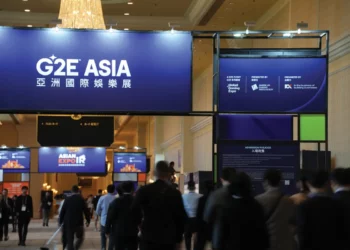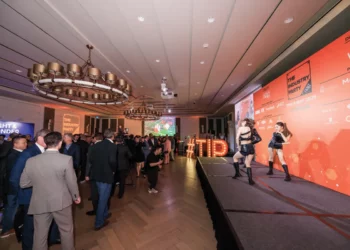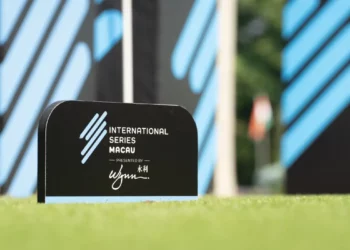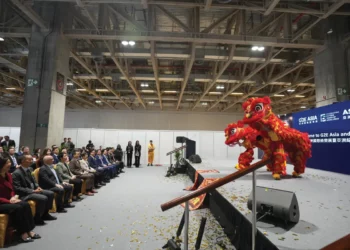1 (5) Francis Lui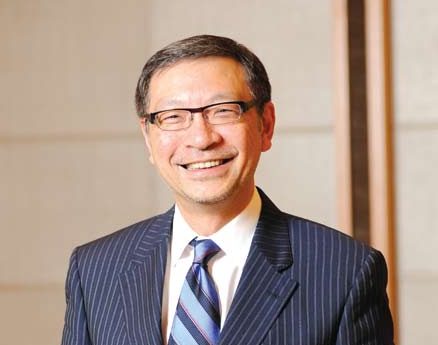
Deputy Chairman
Galaxy Entertainment Group
There were some who laughed when a relatively unknown Hong Kong construction materials company, K. Wah, was awarded a Macau gaming licence back in 2002. They’re not laughing now.
Galaxy Entertainment Group (GEG)—the casino operations business spun off from K. Wah—jumped in July to second place for the first time ever in the Macau gaming revenue league table. That’s not bad for a company with less than a decade’s experience in the industry. The successful execution and launch of the company’s Cotai project, Galaxy Macau, in mid-May, and the subsequent turbo-charging that gave to Galaxy’s already strong market performance, justifies Francis Lui’s jump to first place on this year’s list.
Galaxy’s rise is due to many factors. On a day-to-day operational level, the major contribution from the newly-launched Galaxy Macau is a big reason for the company’s jump in the revenue league table. The resort grossed more in July in the mass and VIP table segments than its Cotai nextdoor-neighbour, Las Vegas Sands Corp’s The Venetian Macao (though not more than The Venetian and Four Seasons combined). The Venetian and the Four Seasons combined cost US$3.47 billion to build. Galaxy Macau cost US$1.9 billion, though it’s fair to point out LVS has more Cotai real estate in terms of shopping, apartments, convention space and entertainment arenas than Galaxy.
Another factor in Galaxy’s rise is the continuing strong performance of the VIP table business at Galaxy’s StarWorld Hotel & Casino on Macau peninsula and the early strong showing of the high roller trade at Galaxy Macau. That’s in the context of a Macau VIP table market that is making an overweight contribution to the 48% year-on-year market growth seen in July GGR.
Galaxy as a group managed HK$4.31 billion in gross table revenue in July. A total of HK$2.13 billion of that came from StarWorld, of which the bulk—HK$1.99 billion (93%)—came from VIP baccarat. Galaxy Macau’s GGR was HK$1.84 billion, of which HK$1.49 billion (81%) was from high roller table play.
Strong revenue performance is the ‘effect’ produced by good management. Mr Lui must take a significant part of the credit for the ‘cause’ part of the equation. He has been able to assemble an executive team that’s not only good at what it does, but seems to be happy in the job and isn’t afraid to connect with staff on the floor. Walk around one of Galaxy’s properties and you frequently see senior executives on the ground—more often than not with smiles on their faces. The latter can’t be said of senior staff at all GEG’s Macau market rivals.
Gross revenue is not the only indicator of GEG’s performance. Capital efficiency and return on investment are also critical factors. In its results for the first quarter of 2011, GEG reported on-going ROI of 69%. That calculation was based on total EBITDA for the previous twelve months divided by the total investment, including land cost.
GEG is known in Macau and beyond for having a relatively conservative approach to financing as compared particularly to its Las Vegas-based rivals in the Macau market. Las Vegas after all was a pioneer of junk-grade bonds in the 1980s, when most of Wall Street wouldn’t touch Sin City with a very long bargepole. The Las Vegas operators who made the jump to Macau have continued applying a highly leveraged funding model to their Asian projects. As well as taking on large amounts of syndicated bank debt, they have also had a penchant for issuing fresh equity. Often that equity has been used to strengthen group balance sheets previously weakened by ambitious projects in home markets in the United States at a time of domestic economic downturn. The equity hasn’t always found its way into the balance sheets of their Asian operations, even if those companies are happy to raise funds from Asian investors and support their share prices on the strength of the Asian gaming story.
By contrast, investors in Galaxy arguably have a lot more transparency. The company’s gaming operations are based solely in Macau. GEG doesn’t have highly leveraged foreign casino businesses that need propping up in markets with anaemic or sluggish economies. That’s not to say GEG lenders and investors have always had a smooth ride. Readers familiar with Macau will recall the bond buy back conducted by Galaxy in early 2009. The flexibility of the bond route (for the indebted party) came to the fore when the company bought out US$170 million worth of its debt for around 50 cents on the US dollar. It was able to do so because some lenders needed liquidity in the wake of the global financial crisis that began in late 2008. GEG later also bought back a further US$50 million of convertible securities. UK-based private equity firm Permira’s US$842 million equity stake in GEG and its parent K. Wah purchased in November 2007 famously lost 94% of its value within a year of the deal, thanks to the investor jitters created by the Western debt debacle. But by June this year Permira’s Galaxy investment had more than doubled in value to US$1.7 billion. Having weathered the storm thus far, Permira indicated at the time IAG went to press that it had no plans to sell its stake.
Galaxy has boosted its returns and punched above its weight in terms of capital efficiency by showing that it really understands its players and junket partners, cares about them, and wants their repeat business. It has shown this with the speed that it has been able to build up both its VIP and mass-market business at Galaxy Macau. Just about every business on the planet pays lip service to the idea of cultivating customer loyalty, but not every company practises what they preach. Galaxy does.
Success in VIP gaming has been the cornerstone of GEG’s Macau success. If you speak privately to those in the junket trade—which currently delivers 74%-plus of Macau’s gross gaming revenue—they will tell you that the support provided by Galaxy is second to none in Macau. That’s not only in terms of things such as cage capital to support the liquidity of junkets—a particular issue for new junkets just starting out that may not have yet had time to build up a large pool of players—but also in terms of facilities. Mr Lui and his management team listened very carefully to the junkets before fitting out its eight VIP rooms at its flagship property Galaxy Macau. And it didn’t skimp on fixtures and fittings. It chose to give the high rollers a distinctively Chinese sense of luxury in an international resort setting.
It’s all a long way from the gloomy days of early 2009, when Galaxy decided to mothball its part-built Cotai resort because of concerns about the risk of a quarter billion US dollar funding shortfall. It’s also a long way from the days back in 2002 when Las Vegas Sands Corp got cold feet at a Macau joint venture with the untried (in gaming management terms) GEG executive team, opting instead to work on its own via a sub- concession from GEG’s licence. We’ll leave it to readers to decide who did best out of that arrangement.
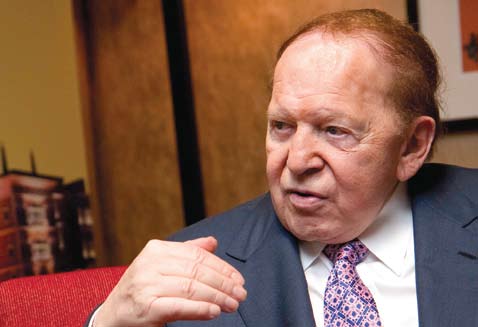 2 (1) Sheldon G. Adelson
2 (1) Sheldon G. Adelson
Chairman and CEO
Las Vegas Sands Corp
So far in the latter part of 2011, Sheldon Adelson and his company have been making headlines for the right reasons. As the only casino operator with a presence in the world’s two most lucrative casino gaming markets—Macau and Singapore—the future looks a lot brighter for Las Vegas Sands Corp than it did during the financial crisis of 2008. Back then, its auditors were required to issue a formal warning about the possibility of the highly-leveraged company going out of business.
If 2010 was also something of an annus horribilis for LVS as far as Macau was concerned—with the announcement of multiple US federal investigations into Sands China’s business and a Hong Kong Stock Exchange probe thrown in for good measure—then the turn of the year wasn’t that great either. In late December, the Macau government rejected an application by Sands China Ltd, the Hong Kong-listed unit of LVS, for rights to a piece land on Cotai previously earmarked for expansion of LVS’s Macau business and known as ‘Plots 7 and 8’.
There was better news in June this year when Sands China said it had secured new US$3.5 billion five-year bank loans and that it had the option to raise another US$1 billion of financing. LVS says the new bank loans will help the company to reduce its interest expense significantly and extend its debt maturities to 2016. LVS previously purchased some relatively expensive debt in the aftermath of the financial crisis for the completion of its US$4.2 billion Cotai plots 5 and 6 (now known as Sands Cotai Central). The new loans may also give the company more wiggle room should it wish at some point to restructure debt still due on its US$2.4 billion Venetian Macao and the US$1.07 billion Four Seasons Macao next door. The company said in its second quarter results for 2011 that interest expense, net of amounts capitalised, was US$70.6 million for the second quarter of 2011, compared to US$77.0 million during the second quarter of 2010.
Perhaps the brightest point of 2011 so far was news that the first phase of Sands Cotai Central could open its doors “early next spring,” in the words of Mr Adelson in a press announcement in early August. He didn’t provide details on the number of gaming tables, slots and hotel rooms that would be release to the market in that first phase. The topic of new tables is a sensitive issue, given that the Macau government has imposed a cap of 5,500 tables on the market between now and the start of 2013, and Macau’s current inventory stood at 5,237 tables at the end of June, according to Macau’s gaming regulator the DICJ.
Sands Cotai Central has previously missed a series of company-imposed deadlines for completion—due to a range of circumstances including many beyond LVS’s control such as global recession and Macau’s labour shortages. Investors will therefore be most happy to see the new deadline successfully met.
Other bright spots this year came in July when LVS said it had appointed Ed Tracy as Chief Executive of Sands China, promoting him from his existing job as President. The CEO post had been vacant for a year since the sacking of Steve Jacobs in the summer of 2010. Michael Leven, the President and Chief Operating Officer of LVS had been acting Macau CEO during that time. Investors welcomed news of Mr Tracy’s appointment. They were also pleased it freed Mr Leven to focus on his strategic role. Soon afterwards, the company named George Tanasijevich as Chief Executive of its Marina Bay Sands (MBS) in Singapore. Mr Tanasijevich had been interim CEO of the 18-month old casino resort since the resignation of the first CEO Tom Arasi in January.
The day before Mr Tanasijevich’s appointment, LVS announced its results for the second quarter of 2011. In Macau, the company achieved what it described as market-leading adjusted property EBITDA margin of 33%. It said two important factors in that margin growth were expansions of its higher margin mass table and slot businesses. In the first half of this year, Sands China nearly doubled its net income compared to the equivalent period in 2010. The company reported a net income of US$540 million (HK$4.19 billion) for the six months ended 30th June, compared with US$251 million a year earlier, according to a statement to the Hong Kong Stock Exchange. Sands China also reported a 50.1% increase in net revenues from its convention, retail and ferry businesses in the first half of 2011—despite the fact that market-wide the number of conventions staged in Macau fell 29% in the second quarter, and the average duration of meetings and conventions in Macau as a whole fell from 2.3 days to 2.1 days.
In Singapore, Marina Bay Sands produced a record US$405.4 million of adjusted property EBITDA during the quarter and an EBITDA margin of 55.0%. Currently, MBS looks on course to pip its Singapore market rival, Genting’s Resorts World Sentosa, to top spot in gross gaming revenue during 2011.
There was more good news in early August. LVS said in a filing to the New York Stock Exchange it had signed up the hoteliers Hilton Worldwide and InterContinental Hotels Group for the right to have their respective Conrad and Holiday Inn brands at Sands Cotai Central. The brands were replacements for those of Shangri-La Asia. The latter company chose not to renew an agreement with LVS for Cotai once the agreement had expired following delays to the project.
The good news kept on coming. In late August, the Nevada Supreme Court ordered a Clark County judge to reconsider whether Sands China Ltd—a company based in Macau—could really be sued in Nevada over allegations relating to Macau. The case has been brought by Steve Jacobs, who claims he was wrongfully dismissed as CEO of Sands China last year. He said it was because he refused to go along with demands that he engage in improper activity, including organising private investigations of members of the Macau government. LVS and Sands China strongly deny the allegations. And Sands China has complained that because of Macau’s strict privacy laws, the process of gathering evidence in Macau on behalf of the court in Nevada and then sharing it between applicant and defendant—known technically as ‘discovery’—will be time- consuming and costly. The Las Vegas Sun newspaper reported, however, that the ruling in the higher Nevada court is not the end of the matter. The newspaper says the jurisdictional tussle will be subject to a hearing all of its own that could take months.
And that sting in the tail is a reminder of another important issue. There are some signs that LVS has not yet recovered all of the community goodwill it lost in Macau following Mr Jacobs’ allegations. That’s despite the strong denials over the claims then and later by the company. When Mr Adelson received his ‘Visionary Award’ from Frank Fahrenkopf, the President and CEO of the American Gaming Association (AGA), during the G2E Asia conference at The Venetian Macao in June, the dining room was full—but not many of the Macau industry’s ethnic Chinese leaders were in attendance. That contrasted markedly with the reception Dr Stanley Ho got the previous year when he received his ‘Lifetime Achievement’ award from the AGA at G2E.
Time is a healer and the Chinese are known for thinking in terms of decades rather than quarter to quarter. But with Macau’s current gaming concessions expiring in 2022 and open to redemption by the Macau government—subject to compensation to the operators—from as early as 2017, Mr Adelson, his company and his investors will be happy if 2011 proves to have marked a permanent upturn in LVS’s Macau fortunes both on the gaming floors and away from them.
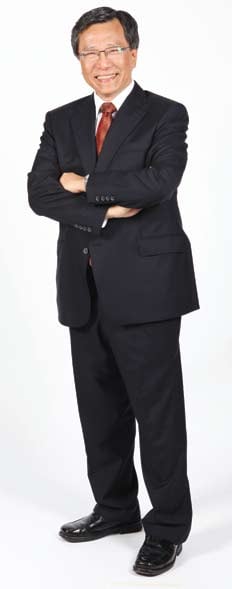 3 (2) Lim Kok Thay
3 (2) Lim Kok Thay
Chairman and CEO
Genting Berhard
Genting’s original casino operation—at Genting Highlands in Malaysia and nowadays branded Resorts World Genting—is literally and metaphorically close to a precipice. Political sensitivities about casino gambling in Malaysia—with its majority Muslim population—mean that RWG’s licence has to be renewed on a quarterly basis. Things could be worse. In June 2008, the country’s Islamic Party proposed introducing a monthly renewal, despite the fact that Muslims are not allowed to use the facility in any case.
No such doubts exist in Singapore. The city-state’s government made Genting jump through a lot of hoops to get a casino licence. But now that it has one, unless the company does something monumentally silly, it has the privilege of a casino duopoly with Las Vegas Sands Corp (LVS) for a 10-year period in a growing market worth around US$6 billion this year according to some analysts’ estimates. That has helped transform Genting into one of the world’s biggest casino operators, complementing its land based operations in the Philippines and the United Kingdom, and giving it the political leverage to build a business in the United States. In addition, Genting has a casino ship business run from Hong Kong in which it has recently been reinvesting.
Genting Singapore, the Singapore-listed entity that runs Resorts World Sentosa, doesn’t offer investors as much operational detail in its results as does its Singapore rival Marina Bay Sands (MBS) run by LVS. But it has recently shown a degree of volatility in its results. CLSA Asia-Pacific Markets estimates hold-adjusted EBITDA (i.e. EBITDA accounting for variations in house win-rate on games) for RWS in the second quarter at US$310 million to US$315 million. On an ‘apples with apples’ basis (with the caveat that quarter-on-quarter comparisons are less reliable than year-on-year ones because of seasonality), that represents a 29% drop on the first quarter hold-adjusted EBITDA, which was US$447 million. It can’t be accounted for by any drag effect caused by Genting Group’s UK casinos operation, Genting Casinos. That business used to be part of Genting Singapore, but was spun off into a separate unit in a sweetheart deal within the group last year.
Genting Chairman Lim Kok Thay and much of his senior management team are Malaysians of Chinese ethnicity. It must be somewhat disappointing for Mr Lim, therefore, that his executives’ direct and detailed knowledge of a big segment of the target clientele hasn’t enabled RWS to go way out in front of its rival MBS when it comes to Singapore market share. That’s particularly the case given that RWS had first mover advantage in a market where Singapore nationals and permanent residents are required to pay a venue-specific levy of S$2,000 per year or S$100 per 24-hour period in order to enter the casinos. RWS opened in time for the busy Chinese New Year holiday in February 2010, while MBS didn’t have its soft opening until April and wasn’t fully operational even in its phase one stage until June that year. MBS also has a senior management team largely composed of Westerners, and has had less management continuity than RWS. In January, the then MBS CEO Tom Arasi, who had guided the project through to launch and early growth, resigned after only 18 months in the job. Yet currently the two Singapore resorts appear to be neck and neck in terms of gross gaming revenue. CLSA recently estimated Genting Singapore achieved GGR of US$740 million in 2Q 2011, compared to MBS’s US$745 million in the same period.
In Macau, the Chinese-run casino operators SJM and Galaxy are noted for their ability to tread carefully with the regulatory authorities and lawmakers. RWS hasn’t been quite as nimble in Singapore, though admittedly the Singapore lawmakers and regulators have a reputation for exactitude. In May, Singapore’s Casino Regulatory Authority (CRA) fined Genting Singapore a total of S$530,000 for four breaches of its rules at RWS. The property was found liable for reimbursing the entry levy payable by Singapore citizens and permanent residents. It was also fined for failing to ensure that casino surveillance footage from several cameras was retained for the specific period required by CRA, the regulator said in a statement. Both examples suggest some systemic weaknesses in RWS’s management at the time of the breaches. There have also been allegations within the industry—strongly denied by Genting—that RWS has been less robust than it might be in policing its VIP table operations for signs of illegal junkets (i.e., third parties unconnected with the casino giving credit to high rollers for VIP play, in contravention of Singapore’s gaming laws and CRA rules).
On the upside, phase two of RWS—including extra hotels and new leisure facilities—is due to start opening in the second half of this year. That may boost EBITDA in the second half, and give a lift to RWS for the busy Chinese New Year period in late January 2012. Genting has also been working assiduously on its regional and global marketing for its portfolio of casino businesses. In July, Genting Casinos, the group’s UK unit announced a deal to sponsor the shirts of Aston Villa FC, a soccer club in the English Premier League (EPL). The significance of this is that the sponsorship includes Genting’s name spelled out in Chinese characters. EPL matches are screened live to tens of millions of people all over Asia, so that with this one deal the Genting brand message reaches customers and potential customers for its casino resorts in Malaysia and in Singapore, plus foreigners thinking of visiting Resorts World Manila in the Philippines (Filipinos are baseball and basketball aficionados, rather than being soccer fans).
While Genting and RWS may have been working hard on branding and marketing to customers, they have a more cautious relationship with the investment community and media. As mentioned earlier, Genting Singapore gives fewer public details on its Singapore casino operations than does LVS. While that may partly be a function of the fact that Genting Singapore is Singapore-listed and LVS is US-listed, it also suggests a difference in management culture compared to LVS. Some observers think that Genting is much more bureaucratic and even sclerotic in its management structures than most Western gaming operators.
That may reflect to some extent the fact that Genting Group is still very much a family business and that ‘investor power,’ and particularly institutional investor power, is not as advanced in Malaysia as it is in Western markets and Western public companies. Mr Lim is a son of Genting’s founder, the late Lim Goh Tong, and has run Genting Group since 2003. Mr Lim is certainly outward-looking in terms of his life experiences—he was educated at the University of London and Harvard Business School. But he also belongs to Malaysia’s patrician class of wealthy Straits Chinese. These are descendants of Chinese who migrated to the Malay peninsula in the 18th, 19th and early 20th centuries from mainland China. They were often very poor labourers, but their progeny have in many cases become self-made millionaires or billionaires. Forbes recently estimated Mr Lim’s personal fortune at US$665 million, but even that only places the 59-year-old at number 13 on its ‘Malaysia’s 40 Richest’ list for 2011.
The key challenge for Mr Lim and his management team in the next 12 months will be to try and make the most of the insights that—in theory at least—they have with the company’s Singapore casino customers via shared culture and in many cases shared language. By the time of the dawn of the Year of the Dragon next January—the eve of Resorts World Sentosa’s second birthday— we may have a better idea of how successful they have been.
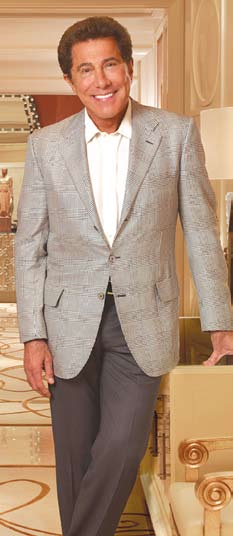 4 (4) Steve Wynn
4 (4) Steve Wynn
Chairman and CEO
Wynn Resorts
This month, Wynn Macau celebrates its fifth anniversary. And its creator Steve Wynn has learned a lot in that time about the Chinese way of doing business. One of those lessons is the network of obligation—of favours done and favours received—which is common to most cultures but is formalised as standard operating procedure in this part of the world. Mr Wynn has also learned that it must be practised in such a way that it never for a moment looks like direct pressure being applied by either party.
To that end, Mr Wynn recently announced a HK$1 billion (US$128.3 million) donation to the University of Macau Development Fund. The money will presumably help the educational institution open its planned new campus in the People’s Republic of China on Hengqin Island—located a thin stretch of water away from Cotai, where the mass-market end of Macau casino gaming is now focused.
There lies the answer to Mr Wynn’s largesse. As with most charitable donations from business in most communities, pure altruism is rarely the only goal. And to put the donation in the context of the red hot Macau gaming market, it represents less than 20% of Wynn Macau’s net revenues in a single quarter—2Q 2011—and it’s spread over 11 years. There are sound and very Chinese reasons for spinning out the love over such an extended period.
Mr Wynn badly wants to get going with his Wynn Cotai project and is under some pressure from the investment community to do so, despite the generally glowing school report Mr Wynn gained from analysts after his company’s 2Q results. But his original ambition, announced in June 2010, for a Cotai opening in 2014 looks like a distant dream because of political and logistical issues in Macau that are outside his control—namely the government’s desire to control the growth of the market and its unwillingness to operate an open door policy for imported labour in construction and hospitality in a market that is already statistically at full employment.
And Sands China is (theoretically) ahead of Mr Wynn in the queue for Cotai construction labour so that Sands can finish its massive Cotai 5 and 6 projects. The Macau government—with the apparent backing of Beijing—is also distinctly lukewarm about allowing the casino market to grow too big too quickly. A year-on-year growth rate in gross gaming revenue in the high 40s of percent is quite big enough to be getting on with, thank you very much, seems to be the authorities’ position.
And there’s also the small matter of getting the Cotai land currently earmarked for the Wynn Cotai project actually gazetted for gaming. In the past, such gazetting of land for development was just a formality. The government and business worked hand in hand with only a nod to the idea of public consultation. Nowadays the process has become more politicised. That’s for two reasons. The first is that nine years after the ‘Big Bang’ of casino market liberalisation in the territory, the presumption is no longer in favour of every casino project being nodded through by a grateful government. Like a plain girl transformed by a reality television makeover show, Macau now truly understands its power of attraction over a slavering investment audience and hyperactive players. Foreign operators are falling over themselves to get into the market or expand their presence here. Gazetting of land is the equivalent in Macau business of the second or third date in a boy-girl relationship. It’s the point at which the government (the pursued) can extract the maximum amount of concessions/pledges/promises of good behaviour from the operators (the suitor) in exchange for the ‘heavy petting’ of land gazetting and ultimately the consummation of an actual casino project.
The second reason for the politicisation of land gazetting is that although the Macau public is nowhere near as outspoken and militant as the populace in neighbouring Hong Kong, there is a growing chorus of voices calling for greater process and transparency in the planning and permissions process. The government is aware of that and appears to be anxious not to be seen to be high handed (even if in reality it still does what it wants).
And that brings us back to the University of Macau donation. The payment of the donation in annual instalments until 2022 makes sound business sense. That’s the year Mr Wynn’s gaming concession is due to expire, although technically the Macau authorities can redeem all the existing concessions from the end of 2017 by giving at least a year’s notice and paying compensation.
Mr Wynn also has some other ideas he’s working on to win favour for his Cotai project. His recent purchase at auction in London of yet more of China’s ancient ceramic art (a lucky eight vases valued at US$12.8 million) looks like another part of the plan. Mr Wynn is interested in fine art and ceramics for their own sakes—he’s been collecting them for many years. But don’t be surprised if he turns at least part of his new Cotai project—assuming all goes to plan—into a private museum-cum-art gallery in the style of the former Wynn Las Vegas Art Gallery. Unlike the Vegas version, however, it might be free to the public as a gesture of goodwill.
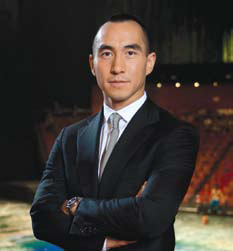 5 (6) Lawrence Ho Yau-Iung
5 (6) Lawrence Ho Yau-Iung
Co-Chairman and CEO
Melco Crown Entertainment
Lawrence Ho’s youth and family connections (as a son of one of the creators of modern gaming in Macau, Dr Stanley Ho) have sometimes been mocked by commentators. Arguably they have overlooked one of the key positives of youthful leadership in the Asian casino market—many of your customers will be a similar age. The median age in the People’s Republic of China is currently 35.5 years, according to data from the Chinese government. Mr Ho is only months shy of that. The cynics have hinted at but also essentially overlooked another important factor. In the West, a famous name often carries the burden of expectation (as Mr Ho’s joint venture partner James Packer, son of Kerry, has sometimes found), but in Asia a famous family name tends to confer respect as well as opening many doors.
On the youth point, there’s certainly exuberance built into MPEL’s flagship Cotai property, City of Dreams (CoD). Aside from the Hard Rock Casino and Hard Rock Hotel brands, one of the outdoor features is a sculpture of Chairman Mao’s jacket fashioned in a terracotta colour. The installation—hinting at reverence for China’s modern past, but stripped of the actual face and body of the revolutionary leader and therefore stripped also of the hard politics of Mao-related iconography—is what clever Western writers like to refer to as ‘post-modern’. In other words, it looks back and looks forward, but doesn’t completely buy in to either viewpoint.
Lawrence Ho’s leadership in the early days of his Macau joint venture with Australia’s Crown Ltd was also somewhat equivocal. Initially a lot of the senior appointments to the Macau joint venture were former Crown executives from the Australian side of the JV. This probably made sense at the time because of Crown’s extensive experience of running gaming operations in its home market. The early placements included Simon Dewhurst as Chief Financial Officer of MPEL and Greg Hawkins as President of CoD. Gradually, however, as Mr Ho found his stride and felt out the market, the Crown managers have been going back home, and MPEL’s management has become more localised. That localisation included the appointment of Ted Chan as Co-Chief Operating Officer, Gaming, across MPEL’s Macau operations. Mr Chan is a long-standing and trusted associate of Mr Ho, and shares his youthful outlook, being only 39. He worked with Mr Ho first at Mocha—the slot clubs operation aimed at local Macau players started by Melco—and subsequently at Altira Macau (formerly Crown Macau)—MPEL’s VIP focused casino on Taipa. Initially, Mr Chan went to work as CEO of an outside company, Amax Holdings Ltd, feeding high roller players to Altira. Then in November 2008, he was back in the fold as President of Altira, before taking up his current group appointment in July 2010.
The advent of a distinctively Chinese feel to the management of MPEL has also coincided with a growing confidence among analysts and investors in the MPEL story. Some of that will be related to timing, given that it has taken a while since CoD’s opening in June 2009 for the resort to get traction in the market—especially in the key VIP segment. But it certainly has traction now. In the second quarter of 2011, MPEL’s net revenue was US$960 million—up 67% year-on-year. The company said the improvement was mainly due to improved rolling chip volumes in the VIP sector across its Macau operations; normalised (i.e., within statistical average) rolling chip win rates at CoD; continued strong growth in mass market and hotel operations at CoD, plus contributions from other non-gaming amenities such as The House of Dancing Water show and Club Cubic at CoD.
Key to the prospects of MPEL in Macau is the effort to improve further the performance of CoD and the successful execution of the plan to take over the Studio City Project. Studio City was always going to use MPEL’s gaming sub-licence. But it was originally supposed to be developed and operated as a US$2 billion project with an opening date of 2009 by partners independent of MPEL in a complex corporate structure. That deadline came and went as the original partners fell out after liquidity issues emerged for one of the parties, eSun, following the global financial crisis of late 2008. This summer, MPEL moved in, cleaned up the MSC ownership structure and announced it would need to raise US$1.7 billion to finish it (US$100 million worth of foundations have already been put in).
This new arrangement may have been agreed among the remaining MSC partners, but it still has to be signed off by the Macau government. Mr Ho and his company are treading very carefully when it comes to public statements on that issue. They will be mindful of others who have fallen foul of local lawmakers in the past by making premature announcements about casino or real estate permissions before they had been officially ratified.
In terms of finance, however, MPEL is proceeding as if the MSC deal will be approved. It needs to, given the lead times that can be involved in capitalising large scale casino resorts in Macau. Mr Ho said in late June that the MSC project company would need to get debt and bank financing, including non-recourse financing, to complete the project. He added that would involve fresh contributions from MPEL, and two of the original MSC partners still involved—US-based hedge funds Silver Point Capital and Oaktree Capital Management. A flurry of market announcements in August, not long after the official shareholder sign-off on the MSC deal, pointed to MPEL’s determination to move quickly on its part of the financing.
In early August, Nasdaq-listed MPEL said it had applied to the Hong Kong Stock Exchange to launch a dual listing in the Chinese territory in conjunction with a potential global share offering. That was followed days later by unofficial media reports citing insiders saying MPEL planned to raise between US$400 million and US$600 million through a Hong Kong initial public offering in the fourth quarter of this year.
Citigroup said it expected proceeds from any Hong Kong IPO to be put toward the US$1.7 billion cost of the Studio City project, but added it expected most of the expenses to be debt-funded. Sterne Agee added that despite recent volatility in Asian markets, a Hong Kong listing for MPEL might provide a valuation hedge against any sharp fall in US markets. Stern Agee noted that the Hong Kong-listed units of Las Vegas Sands and Wynn Resorts Ltd have both been trading at premiums compared with their capital market valuations in the United States.
Lawrence Ho said in a statement that the move would put the company on par with Macau competitors who all have Hong Kong listings, would improve liquidity for shareholders, and give the company access to an additional source of capital and allow local investors to invest directly in MPEL. This time next year, we’ll know if the strategy has paid off.
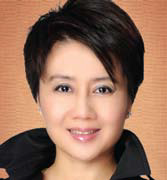 6 (21) Angela Leong On-kei
6 (21) Angela Leong On-kei
Executive Director
SJM Holdings
It was the 16th of July, 2008. The place was the Hong Kong Stock Exchange. The occasion was a ceremony to celebrate the long-awaited, long-delayed listing of SJM Holdings, the new publicly traded arm of Stanley Ho’s casino empire. At his side—as the then 86-year-old tycoon ascended to the dais—was Angela Leong On-kei, or ‘sìtai,’ (‘fourth wife’) as she is popularly known. Ms Leong, from mainland China and four decades Dr Ho’s junior, was originally a professional dancer. By the time of SJM’s initial public offering she had made her way onto SJM’s board. She has borne Dr Ho five children during their two-decade long relationship. By this year she had risen further, to the position of Executive Director—effectively one of the top bosses of SJM—and by August an 8.21% direct shareholder after a series of transactions including several transfers of stock from her husband’s name to hers.
When Dr Ho and a cast of lawyers finally brokered a truce earlier this year between his three surviving consorts and the children of his four families, it was Ms Leong who appeared to be the winner on points. Although Pansy Ho got a directorship of the parent company Sociedade de Turismo e Diversoes de Macau (STDM), it was Ms Leong who effectively was given control—at least for the next six years—of SJM Holdings.
The battle—although not literally bloody in the manner of China’s ancient dynastic feuds—was certainly not pretty. It amounted to Ms Leong facing a hasty alliance of consorts number two and three and their children; principal among them Dr Ho’s most famous daughter, Pansy Ho. There was also the occasional intervention of a daughter from Dr Ho’s first family (his ‘real’ wife, as the daughter concerned rather frostily described that particular Church-sanctioned domestic arrangement).
The ‘alliance’ bloc made a move to transfer Dr Ho’s STDM shares—by which he exercised control of the business—to outside companies affiliated with Pansy Ho and others. Dr Ho took legal action to block it, albeit after the event. In the end, the legal principle that ‘possession is nine tenths of the law’ seemed to come into play. The Pansy Ho faction got to keep most of the STDM shares, while Ms Leong—as the incumbent consort—got enough of a taste to give her a combined interest (directly and indirectly) in SJM of around 12%. And she not only got to keep an executive position at SJM, but saw it enhanced and entrenched. That means she is now the only member of the family directly running SJM’s interests in four directly-owned casinos and 14 ‘satellites’ (casinos licensed by SJM but not fully-controlled by the company). And with SJM on course for more than HK$70 billion (nearly US$9 billion) in casino win this year, it gives Ms Leong a significant amount of power and leverage in the Macau market.
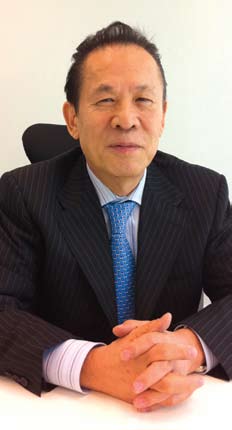 7 (7) Kazuo Okada
7 (7) Kazuo Okada
Chairman Aruze Corp
Vice-Chairman Wynn Resorts
In recent years, Kazuo Okada and Steve Wynn have become something of a double act on the Asian gaming circuit. They’re often to be seen side-by-side at Wynn Resorts’ board meetings held in Macau. The two have things in common aside from investment in Wynn Resorts and membership of the board. Both made their fortunes the hard way; in Mr Okada’s case via the tough, competitive—and in the past murky—world of Japan’s pachinkomachine manufacturing industry, where steel balls are merely one of many components needed for success.
America in general and Mr Wynn in particular have been good for Mr Okada. According to an SEC filing in March Mr Okada and his slot manufacturing company Aruze America are the biggest single shareholders of Wynn Resorts’ voting stock. That Wynn holding and the creation of Aruze America helped to give Mr Okada the international profile and respect he sought as one of Japan’s richest people.
According to Forbes’ ‘Japan’s 40 Richest’ list for 2010, Mr Okada is now back in the ranks of the world’s US dollar billionaires. In 2008, before the financial crisis, he was estimated to be worth twice that—US$2.2 billion to be precise.
Not all Mr Okada’s ‘missing’ millions in the intervening two years are the result of crashing stock markets. He has also invested huge amounts of his own money in the casino gaming industry, and particularly the Asian end of it. He parked US$100 million in escrow alone in a casino project planned for Manila in the Philippines. In 2009, he took private his slot game development unit Aruze Gaming America. He then used his decades of insight into player behavior and player preferences from the pachinko market to make bets on trends in the casino slot and multi-station electronic games segments. Some of the products had ‘legs’ and some didn’t. The important point is Mr Okada understood the high attrition rate inevitable in casino game product launches. He held his nerve and kept going, gathering around him—Steve Jobs-like—a highly-talented team. In just a few years, he helped to create what are now some of the most sought-after games on casino floors across the world. An obvious example is Aruze Lucky Sic Bo, with its now-famous ‘bash button’, giving players the illusion that they—and not an electro-mechanical wobble plate—are in charge of the dice.
To mark the 40th anniversary of his business empire last year, Mr Okada changed the official name of his business (though not the brand name used on his machines) from Aruze to Universal Entertainment. But what could really shape Mr Okada’s future and that of his company for years to come is if he manages to get his hands on one of the proposed integrated casino resort licences in Japan. A broke and pretty desperate Japanese central government is looking to casinos to help dig the country out of the multiple fiscal holes created by decades of: economic stagnation; a shrinking tax base due to the greying of the country; the twin natural disasters of massive earthquake and tsunami; plus the nuclear accident experienced in March. Lawmakers are so desperate that they might just be able to shake themselves out of their usual administrative torpor and actually make casino resorts happen.
At one time it looked as though Mr Okada was Mr Wynn’s meal ticket in Japan if that happy and much talked about day of casino liberalisation ever dawned. Mr Wynn—along with Sheldon Adelson at Las Vegas Sands Corp and one or two other US based operators—is known to have coveted a Japanese casino licence. Japanese spend around Y20 trillion (US$260 billion)—(not a typographical error)—on pachinko each year. Around 800,000 Japanese already visit casinos in South Korea every year, so investment in casino infrastructure in Japan looks like a sure bet. But Japan is a much more opaque regulatory environment and business market than Singapore and even Macau. Mr Okada looked like he would be a big help in cracking the market.
But it seems Mr Okada has now come to the conclusion that working with a Las Vegas casino brand in Japan could be a hindrance or at best not very much of a help when it comes to pitching for a Japanese IR. The first reason is that although the Japanese have thoroughly embraced some Western entertainment brands (such as Tokyo Disney Resort), there’s no real evidence so far that they have a strong attachment to Western casino brands. Like Chinese players, they appear rather more exercised by the excitement and especially the fairness and value of the games played on the premises. In addition, although at the level of public finances Japan may be floundering, in terms of corporate liquidity, many Japanese companies—and some banks—are swimming in cash. They’re hard pressed to put capital to work because of the near zero interest rates that have been a problem in Japan for years, as well as the generally low rates of return available on projects such as real estate development. The potential ROI on Japanese casino resorts—perhaps 20%-plus per year—could be the best thing Japanese investors have seen on their doorstep in decades. Under those circumstances, why would local investors want to share the action with foreigners? And Mr Wynn and Mr Adelson don’t look like the sort of people that would enjoy playing second fiddle to anybody on a project, so a casino branding/management deal might not work either. These points will not be lost on Mr Okada. At times even he has shown his exasperation with the glacial pace of Japanese political decision-making. But if he has the chance to go it alone or with Japanese-only partners on a Japanese IR, he will surely want to grasp it.
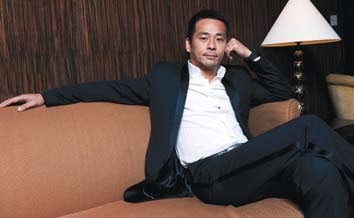 8 (8) Alvin Chau
8 (8) Alvin Chau
Chairman
Sun City Group
Alvin Chau is not only the most dapper entrant in the top ten of the Asian Gaming 50 list, but he, along with his Suncity Group,has also experienced the most meteoric rise.
Although Suncity Group was only set up in 2007, it has become a force to be reckoned with, as one of the big four junket operations in Macau that control around 80% of the local VIP baccarat market—worth US$6.1 billion in the second quarter of this year (and equivalent to 74.0% of Macau’s total casino gaming revenue in the period). Suncity Group runs VIP clubs at 11 Macau venues—the newest club, spanning 20,000+ square feet, is the Galaxy Suncity VIP Club, unveiled at the Galaxy Macau resort opening in May. Suncity also runs a high roller operation at Paradise Walkerhill casino in South Korea, and has representative offices in Japan, Thailand and Taiwan.
By many reports, Suncity is the major Macau junket that has progressed the most over the past twelve months, and that is perhaps a function of the youth and vigour of the 37-year-old Mr Chau. The group strives to distinguish itself from its junket rivals by providing its clients the most complete and highest-quality range of supporting amenities and services, and to that end, has invested heavily in businesses outside the gaming realm.
In 2008, the group established Sun City Tours, which offers comprehensive travel agency services in Macau. Suncity also owns chic entertainment venues, including Club Lotus nightclub at Venetian Macao, which regularly hosts the world’s top DJs and music acts. Macau’s trendy set are also eagerly awaiting Suncity’s Sky 21 Bar and Restaurant, which is now under renovation and is set to open atop AIA Tower at the end of 2011.
Suncity’s media vehicles often bolster its gaming and tourism businesses. ‘Poker King’ was designed to support Suncity’s efforts to develop poker’s following among baccarat-focused Chinese players. Chinese high rollers at Suncity’s Poker King Club in Macau’s StarWorld Casino now play for the biggest pots in the world. Suncity’s poker effort is also supported by its Poker Kingmagazine, while e.traveller magazine and UO Macau—the leading website for Chinese visitors to Macau—help drive visitors not only into Suncity’s arms, but also to Macau as a whole.
Although many of Mr Chau’s non-gaming investments are intended to bolster Suncity’s core activities, others have larger standalone aspirations. Sun Entertainment Group, set up in 2008, has financed and produced big-budget films and is set to release several more potential blockbusters over the coming months. Mr Chau has also invested in big-name concerts—“Amit first World Tour Live Macau”, staged in December 2009, and “2011 Wakin Chau Diva Live Concert”, in August this year, both at the Cotai Arena in Venetian Macao.
Mr Chau’s continues to expand his all-inclusive branded experience with recent acquisitions in finance, media, and health and beauty across the Hong Kong, Macau, and China regions.
Suncity Group’s business interests go even further afield, and include the development, marketing and production of software, and even an 80 million ton capacity iron mine in Indonesia. The odds are favourable that Mr Chau’s stratospheric rise in gaming is soon likely to be replicated in any one of his new chosen business interests.
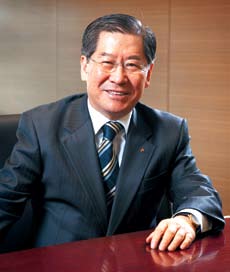 9 (9) Kwon Oh-nam
9 (9) Kwon Oh-nam
President and Chief Executive
Grand Korea Leisure
Grand Korea Leisure (GKL) is a semi-privatised owner and operator of three foreign-players-only casinos in South Korea with good connections to the government. In the foreigners-only segment it is the biggest operator by gross gaming revenue (GGR) in the country with around 54% of a market worth annually around US$1 billion—and rising. The domestic market, served by just one casino—Kangwon Land—is worth another US$1 billion annually.
The government recently announced that in 2015 it will end the monopoly of Kangwon Land as the only one of the country’s 17 casinos allowed to cater for South Korean nationals (the others can only serve foreigners or Koreans with foreign passports and/or foreign residency). South Korea also plans to allow up to five integrated gaming resorts (IRs) of international standard in the country in the next decade or so.
GKL floated 30% of its stock on the Seoul stock exchange in November 2009. There was talk of more stock being sold off to private investors, but currently the company is still majority-owned by the South Korean government. Kwon Oh-nam, the company’s President and CEO, has the ear of many lawmakers and civil servants from his days as a senior executive at the Korea Trade Investment Promotion Agency. That may help when it comes to GKL lobbying for access to the new gaming opportunities at home.
Grand Korea currently operates under the Seven Luck brand with three venues in two of the most lucrative markets in the country. It has two properties in the country’s capital Seoul and one in Busan. Its nearest competitor, Paradise Group, has five properties, but only 41% of the foreigners-only market by GGR.
GKL’s gross revenue grew by 25% year-on-year in 2009 (admittedly off a somewhat depressed base in 2008 following the global downturn) to hit KRW532 billion (US$500 million). The company’s 2010 results had not been confirmed at the time Inside Asian Gaming went to press, but CLSA Asia-Pacific Markets said in a special report on Korean tourism, published in February, that it expected GKL to have registered a 9% year-on-year expansion in GGR to KRW578 billion (US$543.1 million) in 2010, and projected a 15% increase on that in 2011.
Grand Korea has a better balance of higher-margin mass market players versus VIP players than Paradise. GKL’s split, according to the most recent available data collated by CLSA, is 80% VIPs and 20% mass. GKL states that around 85% of its high rollers are the most profitable kind—direct players brought in by the company’s in-house marketing team. Recently, however, GKL has also done deals with Macau junkets to bring in more Chinese VIPs. Paradise has 90% VIPs and only 10% mass customers, although it has a higher proportion of direct high rollers than GKL—around 90%.
In 2009, GKL posted pre-tax profit of KRW158.1 billion (US$148.5 million at current exchange rates). In the same period, Paradise Group had pre-tax profit of only one quarter that amount—KRW40.1 billion.
The South Korean authorities say that the licensing for at least one new venue catering for domestic players will take place in or soon after 2015. The most likely location for such a venue seems to be Incheon, near the capital Seoul. The Seoul metropolitan area is home to 24.5 million people—nearly half of South Korea’s entire population. Incheon sits inside that area. It is also home to the capital’s air hub—Incheon International Airport; one of the best connected and busiest airports in the world. At least one international-standard integrated resort will be located in Incheon, identified by the government as an economic development zone. There was a previous plan in 2005 to build a US$1.12 billion IR there, but the plan was effectively killed off by the 2008 financial crisis. Some industry observers suggest an expensive new casino resort at Incheon would only be viable if it were open to local players. But the government has thus far not said whether that IR could also double as a venue serving domestic players.
Grand Korea could be in the running for involvement in one or both of these new opportunities. The last time a new foreigners-only licence was issued by the government—in 2005—it went to GKL. Given that GKL and Paradise Group are probably the only South Korean casino operators with the level of operational experience and depth of foreign business contacts to be able easily to attract foreign joint venture partners, they must be front runners for integrated resort licences and/or domestic licences as and when the government makes its move.
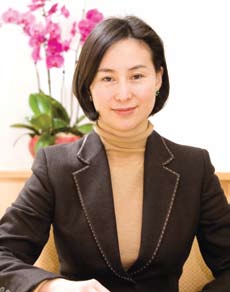 10 (10) Pansy Ho Chui-king
10 (10) Pansy Ho Chui-king
Chairman MGM China Holdings
Director STDM
Managing Director Shun Tak Holdings
This has been a milestone year for Pansy Ho. It was the year when in the minds of the public she moved from being ‘Stanley Ho’s daughter running a Macau casino’ (MGM Macau), to a major figure in the industry in her own right. That process began with the official retirement from business of her father, Dr Stanley Ho, in December last year. For years, Ms Ho has been earmarked by the local and regional media as the heir-apparent to her father’s extensive business interests in Macau. In Chinese business culture, such transitions are generally more complicated and more opaque than that—not least because there may be many princelings and princesses (and in Dr Ho’s case, many wives) jockeying for position.
In any case, China also tends to have a much more consensual, group-focused culture than societies in the West. That applies to business as well as politics. Stick your own metaphorical neck out too far, and you may find your metaphorical head gets chopped off. Ms Ho looked for a few weeks at the turn of the year as if she were heading in that direction when she made a pre-emptive swoop for her father’s controlling shares in STDM while he recuperated from his lengthy illness at home. It earned not only a public rebuke from Ho père, but for a while legal action by Dr Ho and other members of the family. After two months of wrangling—some of it via recorded video statements posted on YouTube—a truce was called that effectively split the influence in the family empire between Ms Ho and her allies, and Dr Ho’s fourth consort Angela Leong and her children. Ms Ho remains a director of STDM (the umbrella business for Dr Ho’s Macau investments), while Ms Leong was given a guaranteed role as Executive director of SJM (the Hong Kong-listed unit of STDM that also has a Macau subsidiary responsible for casino operations) for six years.
The torturous process of drawing up a family truce was evidence of the value of alliances and consensual working. Not that Dr Ho fought shy of being tough during his own long career. But what he understood was that when toughness is required it must be applied dexterously, with all the skill and speed of a surgeon—preferably before the patient even knows he’s being operated on. Dr Ho was a master at this after nearly five decades’ practice. Western-educated Ms Ho is no dummy. She understands the theory from her own experience and from watching the master at work. But on occasions she’s also had to learn the hard way where the boundaries are regarding charm versus brute force.
STDM—or rather an iteration of it—ran Macau’s casino monopoly for 40 years. After market liberalisation in 2002, STDM became the parent of a new entity, SJM Holdings Ltd. The latter company is in turn parent to the largest casino operator in Macau by volume of gross gaming revenue, Sociedade de Jogos de Macau SA. So when Ms Ho was confirmed as a director of STDM, she was in practice being given one of the keys to the family castle. She must now apply patience and possibly some guile to make sure she eventually acquires all the keys to all the doors. The process of Ms Ho’s steady rise up the Macau hierarchy continued in May with her confirmation as chairman of MGM China Holdings, following the s
successful Hong Kong-listing in May of that company as a holding vehicle for MGM Macau. The latter casino resort on Macau peninsula—originally trading under the brand MGM Grand Macau when it opened in December 2007—was Ms Ho’s start in casino gaming when she became a 50:50 joint venture partner with MGM MIRAGE (now MGM Resorts International) using a sub-licence from her father’s gaming concession. She is also managing director of Shun Tak Holdings, a Hong Kong-listed shipping and property conglomerate founded by her father. It is best known for supplying the majority of the ferries that sail between Hong Kong and Macau. It also developed and owns Macau Tower and was a stakeholder with Honkong Land in the construction of the residential and shopping development One Central, next door to MGM Macau on the Macau peninsula.
This network of Ho family investments indicates the extent of Ms Ho’s influence in Macau. A full explanation would probably need a flow chart rather than a brief biography. The key takeaway is that she now holds a unique position not just in contemporary Macau but in the recent history of the territory’s casino industry. For the first time in the modern era (i.e. since Dr Ho and his then partners were granted a casino monopoly in 1962), Ms Ho has been allowed to be both shareholder and director of two supposedly competing companies in the Macau gaming market—namely, STDM and MGM China Holdings (she holds an indirect minority stake in STDM and a direct but large minority stake in MGM China).
The Macau government seems to feel that allowing Pansy Ho some control simultaneously over two Macau companies with competing gaming interests is a lesser evil than having a chaotic succession at STDM/SJM. The latter companies are, after all, essentially proxies for maintaining Chinese control over a burgeoning gaming market that has major foreign participants in it. In the coming months and years, Ms Ho will have the opportunity to show that she is equal to the task of following in her father’s very sizeable footsteps and that—in the phrase often used to describe nonpresidential, cabinet-led government—she knows how to be ‘first among equals’.























